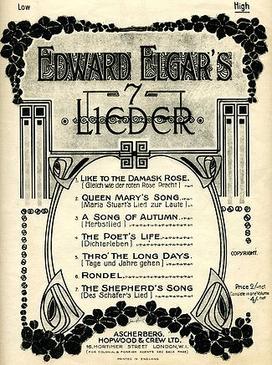
Sir Edward William Elgar, 1st Baronet, was an English composer, many of whose works have entered the British and international classical concert repertoire. Among his best-known compositions are orchestral works including the Enigma Variations, the Pomp and Circumstance Marches, concertos for violin and cello, and two symphonies. He also composed choral works, including The Dream of Gerontius, chamber music and songs. He was appointed Master of the King's Musick in 1924.
"Pleading" is a poem written by Arthur L. Salmon, and set to music by the English composer Edward Elgar in 1908, as his Op.48.
Was it some Golden Star? is a poem written by Gilbert Parker, published in Volume I of a series of poems called Embers. It was set to music by the English composer Edward Elgar in 1910, as his Op. 59, No. 5.
Twilight is a song with music by the English composer Edward Elgar written in 1910 as his Op. 59, No. 6. Elgar set the words of the poem The Twilight of Love, from Volume 2 of a series of poems called Embers by Sir Gilbert Parker. The Opus 59 songs were part of a song-cycle of six romantic songs by Parker that was never completed – Nos 1, 2 and 4 were never composed. The other songs were Oh, soft was the song and Was it some Golden Star?. The songs were originally written with piano accompaniment, but this was later re-scored by the composer for full orchestra.
Oh, soft was the song is a song with words by Gilbert Parker set to music by the English composer Edward Elgar in 1910, as his Op. 59, No. 3. It is the second and last verse of a poem At Sea which Parker published in Volume I of a series of poems called Embers. The Opus 59 songs were part of a song-cycle of six romantic songs by Parker that was never completed – Nos 1, 2 and 4 were never composed. The other songs were Was it some Golden Star? and Twilight. The songs were originally written with piano accompaniment, but this was later re-scored by the composer for full orchestra.

Speak, Music! is a song written by the English composer Edward Elgar in 1901 as his Op.41, No.2.
”Through the Long Days” is a song written by the English composer Edward Elgar in 1885 as his Op.16, No.2. The words are from a poem by the American writer and statesman John Hay.
”Queen Mary's Song” is a song written by the English composer Edward Elgar in 1889. The words are from Lute Song by Tennyson.

"After" is a song written by the English composer Edward Elgar in 1895, as his Op. 31, No. 1, with the words from a poem by Philip Bourke Marston.
"Follow the Colours" is a marching song written by the English composer Edward Elgar in 1907, with words by Capt. William de Courcy Stretton. The song is for male voice solo with an optional male voice chorus, accompanied by piano, orchestra or military band.

”Inside the Bar" is a song written in 1917 by the English composer Edward Elgar, with words by Sir Gilbert Parker.

The Starlight Express is a children's play by Violet Pearn, based on the imaginative novel A Prisoner in Fairyland by Algernon Blackwood, with songs and incidental music written by the English composer Sir Edward Elgar in 1915.

The Fringes of the Fleet is a booklet written in 1915 by Rudyard Kipling (1865–1936). The booklet contains essays and poems about nautical subjects in World War I.
Une voix dans le désert("A Voice in the Desert") is a recitation, with a soprano soloist and orchestra, written by the English composer Edward Elgar in 1915 as his Op. 77. The French words are by the Belgian poet Émile Cammaerts.

Seven Lieder is a set of songs by the English composer Edward Elgar published together in 1907, by Ascherberg, Hopwood & Crew Ltd.

"In Moonlight" is a song with music written by the English composer Edward Elgar in 1904 to words from the poem "An Ariette for Music. To a Lady singing to her Accompaniment on the Guitar", by Percy Bysshe Shelley (1792-1822) and published in 1832.
William Henry Reed was an English violinist, teacher, composer, conductor and biographer of Sir Edward Elgar. He was leader of the London Symphony Orchestra for 23 years (1912–1935), but is best known for his long personal friendship with Elgar (1910–1934) and his book Elgar As I Knew Him (1936), in which he goes into great detail about the genesis of the Violin Concerto in B minor.

Caroline Alice, Lady Elgar was an English author of verse and prose fiction, who married the composer Edward Elgar.

From the Bavarian Highlands, Op 27 is a work for choir and orchestra by Edward Elgar.










